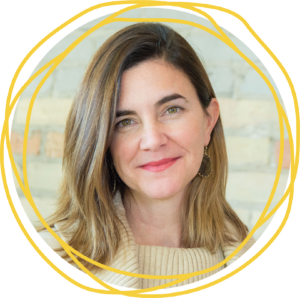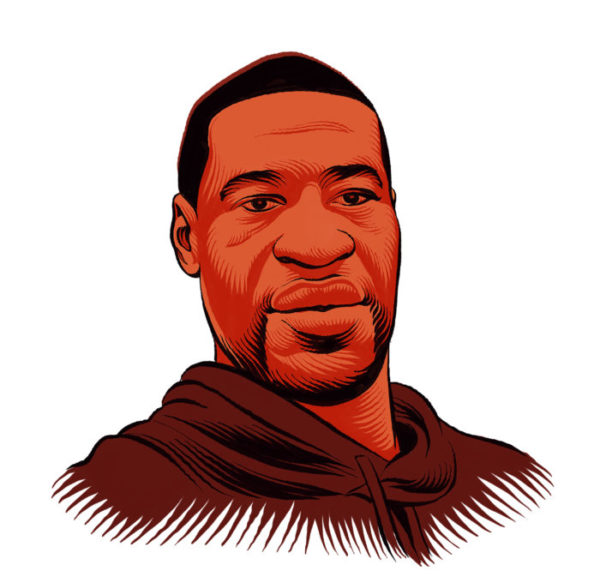Art by Andres Guzman (Instagram: @andresitoguzman)
This week, we grieve for America. For the familiar refrain of black bodies killed by structural violence rooted in white supremacy and the legacy of slavery. And as a consequence of the modern-day weaponization of whiteness that causes harm – and death – a straight line can be drawn from Amy Cooper in Central Park to George Floyd in South Minneapolis.
The week began with the viral video of a woman in central park, calling 911 on a black man birdwatching, who asked her to leash her dog who was disrupting the habitat (and was off-leash against the stated rules). Then on Monday came the murder of George Floyd by police in Minneapolis, who crushed his neck for at least 7 minutes, ignoring cries of “I can’t breathe. Everything hurts. They are going to kill me.” And on Tuesday, in the WeWork in Minneapolis where World Savvy offices, a white CEO called 911 on a group of young Somali entrepreneurs who share the same space, using the office gym, assuming they were there illegally. Though this kind of institutionalized racism has been in the air we all breathe for hundreds of years, social media offers us all a window into its particular cruelty and violence. It is a reckoning that we cannot choose any longer to pretend is overblown or overstated. And yet, videos of murder sometimes offer fodder for debate, rather than a unified outcry for accountability and change.
The weight of this, and what comes next – the healing and the repair – must begin and end with reflection and accountability for how we can all do better. Why does this matter, must it matter, to me? To our organization?
Reflection
I am a white woman living in Minneapolis, by way of New York City, where these most recent incidents occurred. I’m the mother of two daughters, and the co-founder of an organization that for 18 years has been committed to engaging youth in the pursuit of radical empathy, relentless curiosity about the world around them, critical thinking about the root causes of injustice, and deep understanding of the people who shape our communities–however different from ourselves and our own experiences. I founded World Savvy with my dear friend, Madiha Murshed; a Bangladeshi Muslim who endured the xenophobic backlash in post 9/11 America and believed a different future was possible, and that education was the most powerful platform to strive for that. But the calculus for my decisions – every choice I make as a parent and a professional and a citizen – are shaped and privileged by my lived experience as a white person. An advantage I did nothing to earn except be born in the skin I am in.
When I talk with my children about the history of slavery and criminal justice reform, and systemic racism, it’s a choice; to ensure my children grow up awake and aware. But for a black or immigrant mother or father, these are not choices; these conversations are blueprints for survival for themselves and their children. They are the acknowledgment that this is a Tuesday morning in America, in 2020. I shudder to reconcile a world in which I would pray for the graphic video of my child’s violent murder to go viral, in search of an audience who can muster outrage; a world in which I would require that evidence to prove the injustice. And even then, to endure the inevitable debate of its merits – of the delayed and all too often unattainable justice for the atrocity.
Accountability
In the face of this, and in the spirit of accountability, we are sharing the actions we are taking – actions you can take also – to call for justice for George Floyd, and to do your own work toward anti-racism:
Learn: we are recommitting ourselves to our own internal anti-racist work – to learning, listening, and working toward Ijeoma Oluo’s call to “fight racism wherever you find it, including in yourself.” No matter where you are on your own anti-racism journey, the following resources offer chances for deep learning:
- A Public History of 35W, Mapping Prejudice, and MDP150 project shed light on the history of racism in policy and policing in Minneapolis.
- This Anti-racism resources for white people Google doc, this Shareable Anti-Racism Resource Guide, this Anti-Racist Allyship Starter Pack, and this spreadsheet of Anti-Oppression Resources all have a wealth of resources for both adults and children in their anti-racism journey. (Please note that attribution does not appear within the spreadsheet, and we have been unable to determine it – if you know who made this, please share so we can update!)
- The Aspen Institute “11 Terms You Should Know to Better Understand Structural Racism”
- The 1619 Project from The New York Times Magazine, curated by Pulitzer Prize-winning reporter Nikole Hannah-Jones
- Scene on Radio “Seeing White”
- Today’s Parent “How to talk to kids about racism: An age-by-age guide”
- Teaching Tolerance “Don’t Say Nothing: Silence speaks volumes. Our students are listening”
- The Washington Post “How should teachers and parents talk to kids about police violence?”
- The Conscious Kid
- These podcast episodes with Ricardo Lopez, a senior reporter for the Minnesota Reformer: Politico Dispatch and Today, Explained covering the history of the police violence in the city and how we got here today.
- This interview by Christiane Amanpour with Deray McKesson, civil rights activist and former Minneapolis Public Schools staff member, and Martin Luther King III, human rights advocate.
Listen: here are people of color in our community who are speaking up on behalf of justice, and provide additional ways to advocate for justice and supporting your neighbors of color.
Many individuals listed here offer additional resources they have created themselves for your own anti-racist journey. Please keep these things in mind when you interact with the resources they have created: 1) Most will have a welcome or “read first” section in their bio or website that includes instructions for how to utilize the resources and/or interact in the community they have created. Please read these first and honor them. 2) Many also have a Patreon page. If you utilize resources they have created, recognize the creative, intellectual, and emotional labor involved in this, and please support them however generously you are able.
Just a few of the voices we are listening to:
- Mike Griffin, Minneapolis Activist, @votegriffin
- Christiane Cordero, WCCO Reporter, @christianewcco
- Ricardo Lopez, MN Reformer Reporter, @rljourno
- Sheletta Brundidge, Author, @shelettaisfunny
- Nekima Levy Armstrong, Civil Rights Lawyer, @nvlevy
- Alicia Garza, Co-creator of Black Lives Matter, @aliciagarza
- Opal Tometi, Co-creator of Black Lives Matter, @opalayo
- Patrisse Cullors, Co-creator of Black Lives Matter, @OsopePatrisse
- Ijeoma Oluo, Author, @IjeomaOluo
- Brittany Packnett Cunningham, Activist/Writer/Educator, @MsPackyetti
- Austin Channing Brown, Writer/Speaker/Producer, @austingchanning
- Layla Saad, Author of Me and White Supremacy, @laylafsaad
- L Glenise Pike, Anti-racism educator and author, @elleglenisepike
- Rachel E. Cargle, Writer/Lecturer/Public Academic, @RachelCargle
- Nikole Hannah-Jones, Journalist, NYTimes 1619 Project, @nhannahjones
- Raquel Willis, Writer/Activist/Speaker, @RaquelWillis_
- Monique Melton, Anti-racism Educator, @moemotivate
- Reverend Jacqui Lewis, PhD, Anti-racist Activist and Minister, @RevJacquiLewis
Advocate: we are taking action and calling for justice for George Floyd and wider reforms to policing and policy.
This Google Doc, Taking Action for George Floyd, courtesy of the Coven in Minneapolis, is “a collaborative resource list of ideas to help white people show up for racial justice” and includes many concrete actions we can all take right now.
Give: we are supporting organizations working for racial justice and criminal justice reform, local media, and those most impacted by George Floyd’s death.
At World Savvy we stand in solidarity and support of the many colleagues and organizations working toward this vision of a different future, a more just and equitable reality. We are here in support of the students, teachers, and families we work alongside who are adversely affected – every single day – by this structural violence. And we are committed to doing our own work that advances learning, discourse and truth-telling in the service of that vision for our future.
And on behalf of our team, our Board, and the amazing network of colleagues and collaborators impacted by events like these that have become all too common in America, we grieve. And we will keep striving for a different reality, with relentless hope for a day when this is not a Tuesday morning in America.

Dana Mortenson is the Co-Founder and CEO of World Savvy. Dana is an Ashoka Fellow, was named one of The New Leaders Council’s 40 under 40 Progressive American Leaders, and was winner of the Tides Foundation’s Jane Bagley Lehman award for excellence in public advocacy in 2014. She is a frequent speaker on global education and social entrepreneurship at high profile convenings nationally and internationally, and World Savvy’s work has been featured on PBS, the The New York Times, Edutopia and a range of local and national media outlets covering education and innovation.
